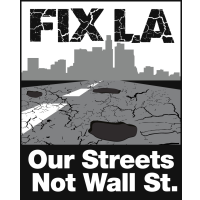L.A. Spends 30% More on Wall Street Fees than Streets, and That's Just Half the Story

The city of Los Angeles spent at least $204 million on Wall Street fees—not counting principal or interest on loans—last year, $41 million more than the budget for its Bureau of Street Services, according to a report (pdf) from a coalition of community, civil rights and labor groups.
“No Small Fees: LA Spends More on Wall Street than Our Streets,” from the Fix L.A. Coalition, does not make any claims of nefarious actions by bankers or municipal officials; instead, it documents how business as usual costs the city millions of dollars it can ill afford to spend and suggests ways to avoid it.
The $204-million-dollar figure is actually the report's conservative estimate on how much the city pays annually on a plethora of fees. The authors had to root around in city documents for the unpublicized information it cobbled together but suspect there is much more to be learned. “Alarmingly, we have concluded that the fees we were not able to document may exceed those we could document,” they wrote.
While the city readily provides a budget figure for what it spends on municipal functions like street maintenance and improvement, it is not so forthcoming on Wall Street fees. That is no surprise. “Municipal markets are characterized by poor information and illiquidity,” according to a study (pdf) published by the Hamilton Project at the Brookings Institution.
What the Fix L.A. folks say is known is that the city paid $133.1 million on investment management fees, $23.1 million on natural gas swaps, $17.9 million on letters of credit and $12.9 million on bond issuance costs. What they do not know is what was spent on fees involving private equity investments because they are not subject to public disclosure laws.
Wall Street has an advantage when arranging financing for municipal bonds because, unlike stocks and options, they are traded primarily on over-the-counter networks rather than open exchanges. That impedes competitive market pressures, according to the Brookings report. Its authors propose establishment of a “CommonMuni,” a privately-financed national institution that would give independent, low-cost advice to municipal issuers. It would be modeled after a fund that manages $25 billion in investments by more than 1,500 universities, hospitals and other nonprofit organizations.
Failing that, Fix L.A. suggests that the city could better leverage the $106 billion in assets, payments and debt issuance controlled by its seaport, airport, utilities and pension funds that course through the Wall Street's veins. “The city would have far more negotiating strength if it consolidated its dealings with Wall Street, instead of dispersing them among nearly a dozen departments,” the report says.
That leverage could be used to renegotiate some of the risky deals, such as interest rate swaps the city obtained years ago as a market hedge against inflation, that tanked during the Great Recession. The suppression of any hint of inflation by the U.S. Department of the Treasury in ensuing years has generated a huge windfall for Wall Street to the detriment of governments and taxpayers.
“No Small Fees” highlights one “toxic deal” with New York Mellon Bank that could cost the city $65.8 million through 2028. The bank wants $24.7 million in penalties from the city to terminate the swap.
As the city prepares to head into the next fiscal year starting July 1, it is probably ending the year with a $21 million deficit. It faces a budget shortfall of $242 million for next year that newly-elected Mayor Eric Garcetti vows to eliminate. The solution probably won't include recapturing money from Wall Street.
–Ken Broder
To Learn More:
How Wall Street Is Sucking Huge Amounts of Money from Los Angeles (by Les Leopold, AlterNet)
Why Is L.A. City Hall Spending $204 Million on Bankers' Fees? (by Dennis Romero, LA Weekly)
Study: Wall Street Banks Overcharge L.A. (by Jon Zerolnick, Capital & Main)
Stop the Bank Robbery of Los Angeles (Fix L.A. Coalition)
Los Angeles Faces Financial Shortfall Heading Into Next Year (by Alice Walton, KPPC)
Lowering Borrowing Costs for States and Municipalities Through CommonMuni (Andrew Ang and Richard C. Green, Brookings Institution's Hamilton Project) (pdf)
No Small Fees: LA Spends More on Wall Street than Our Streets (Fix L.A. Coalition) (pdf)
- Top Stories
- Controversies
- Where is the Money Going?
- California and the Nation
- Appointments and Resignations
- Unusual News
- Latest News
- California Forbids U.S. Immigration Agents from Pretending to be Police
- California Lawmakers Urged to Strip “Self-Dealing” Tax Board of Its Duties
- Big Oil’s Grip on California
- Santa Cruz Police See Homeland Security Betrayal in Use of Gang Roundup as Cover for Immigration Raid
- Oil Companies Face Deadline to Stop Polluting California Groundwater





